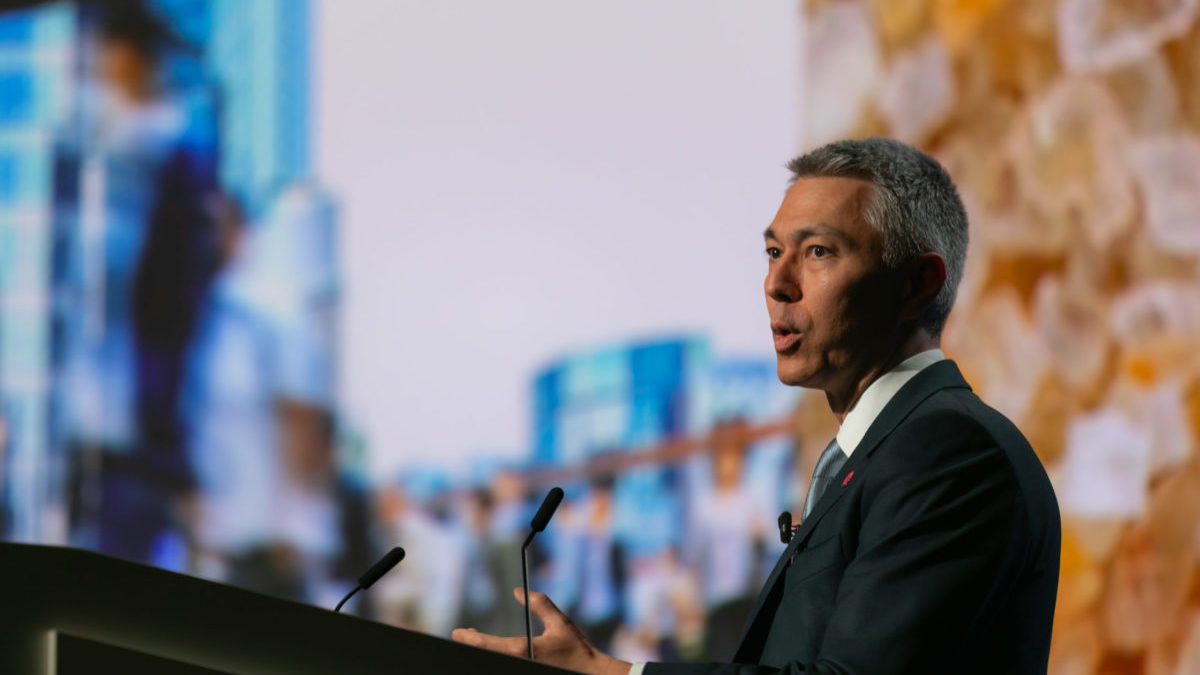Monsters of Rock: The world’s biggest mining monster BHP continues to believe in China

BHP CEO Mike Henry. Pic: BHP
- 80% of Chinese steel mills currently making losses, which is bearish for iron ore
- BHP CEO Mike Henry confident China’s economy will outperform after near term struggles subside
- Miner believes demand for high grade met coal will stay strong “for decades to come”
China’s Iron and Steel Association came out with a pretty devastating stat a couple weeks ago, revealing that 80% of the 200 or so mills owned by its members were suffering losses.
According to MySteel, as of early November, rebar was being produced at an average margin of negative US$33/t.
Hot rolled coil producers were even more troubled, selling their wares at an average loss of US$46/t.
Some, like our favourite chartist Carl Capolingua, reckon the sort of chatter pouring forth from Chinese steelmakers is pretty bearish for iron ore.
The bad steel data has come amid confusion around whether China will look to reverse its Covid Zero policy after Xi Jinping’s effective coronation at the National Congress in Beijing last month.
Singapore futures fell as low as US$77.17/t recently before rebounding by over US$10 over the past week on market boosting reopening rumours, which have been punctured by high caseloads in new epicentres like Guangzhou.
BHP (ASX:BHP) has been fond over the past 12 months of saying China’s economic recovery would be a tailwind for demand in the commodities it produces and sells, especially iron ore, where at shipments of 278-290Mt this financial year it will be the world’s third largest exporter after Rio Tinto (ASX:RIO) and Vale.
Speaking after the world’s biggest miner’s AGM today, CEO Mike Henry told reporters he remains confident China’s economy will outperform after its near term struggles subside.
‘We continue to believe that over the next 12 to 18 months, which is what we’ve said previously, China’s going to provide an underpinning of stability for the global economy,” he said.
“So where other economies are turning down more strongly, we think demand out of China is going to be a positive.
“Now, as we move into the winter period, depending on what’s happening with COVID, could we see a bit of turn down in steel? Yes, of course.
“But again, the decisions in BHP and the way that we run the company really isn’t informed by what’s happening over the next three months, the next six months.
“We want to make sure that we’re running as efficiently, productively and safely as we can at all points in the cycle.”
Long term focus
BHP’s recent fiscal performance is a sight to behold, though one largely driven by bull market iron ore and subsequently coal prices, including a record FY22 EBITDA of US$40.6 billion, free cash flow of US$25.2b and record cash returns of US$16.4b to shareholders.
But Henry stressed BHP was focused in longer term investments in commodity markets advantaged from “megatrends” that will play out over the next three decades.
“What’s happening with the global economy over the next few decades, we’re do we see growth in China going, where do we see growth in India and Southeast Asia going?” Henry said.
“What are the commodities that are going to be needed and how do we position ourselves to be able to ride that tide of increasing demand for certain commodities?
“We’ve done that successfully in the past, the actions we’ve taken over the past 12 months, we believe position us pretty well for what we’re going to see play out in the coming decades.”
One bet BHP has made is on “future facing commodities”, siphoning its oil and gas business into a merger with Woodside (ASX:WDS), selling its stake in the Cerrejon mine in Colombia to Glencore at what seems like the worst possible time, immediately before a thermal coal boom, and stamping its credentials in copper, nickel and potash.
In that context, Henry played a straight bat to questions on whether it would increase its rejected $25/sh bid on SA copper miner OZ Minerals (ASX:OZL), trotting out the now well worn line that it’s a “nice to have, not a must have”.
Climate in focus
Responding to questions from shareholders, Henry and chair Ken Mackenzie continued to state their belief steelmakers would require BHP’s high grade met coal for decades to come.
As for the business of the AGM, all of BHP’s resolutions passed with little disquiet.
Resolutions on climate advocacy and accounting submitted by the Australasian Centre for Corporate Responsibility were not supported by the $200 billion miner and received 12.73% and 18.67% votes in support from proxies.
The ACCR described BHP’s decision not to support the resolutions, which rarely are endorsed by public companies, as “unjustified”.
“ACCR’s shareholder resolutions sought to enhance BHP’s climate policy advocacy, along with the company’s recognition of climate change in its financial statement,” ACCR climate lead Harriet Kater said.
“Surprisingly the BHP board recommended against both resolutions, undermining its supposed commitment to climate change action and best practice disclosure.
“BHP’s strong opposition to the climate accounting proposal has been quite startling given Origin Energy recently agreed to implement the same proposal and that the resolution text is aligned with the Climate Action 100+ Climate Accounting and Audit indicator.”
The ACCR has called on BHP to “engage constructively” on the issues raised in the resolutions going forward. BHP said the requested information would conflict with accounting standards.
“The financial statements are a key component of the Group’s annual disclosure and a core basis for investment by shareholders,” BHP said in its notice of meeting ahead of the AGM.
“It is not appropriate for the BHP Board to commit to include information in the financial statements that conflicts with the accounting standards, and is inherently speculative and potentially misleading.
“The requested disclosure conflicts with the accounting standards and carries with it a risk of misleading readers.”
BHP (ASX:BHP) share price today:

UNLOCK INSIGHTS
Discover the untold stories of emerging ASX stocks.
Daily news and expert analysis, it's free to subscribe.
By proceeding, you confirm you understand that we handle personal information in accordance with our Privacy Policy.








